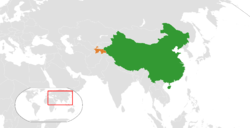China–Tajikistan relations
China–Tajikistan relations are the bilateral relations between the People's Republic of China and the Republic of Tajikistan, established on January 4, 1992, shortly after the dissolution of the Soviet Union.
 | |
China |
Tajikistan |
|---|---|
Economy and trade
The total trade turnover between the two countries in 2012 has reached U.S. $2 billion. China is among the three largest trade partners of Tajikistan.[1] A number of large Chinese enterprises in various industries operate in Tajikistan.
Border dispute
China had a longstanding territorial claim on about 28,430 square kilometers (10.977 square miles) of Tajik territory since 1884, which was taken from the then Qing dynasty by unequal treaties.[2][3] In 2011, as part of a border agreement, Tajikistan ceded over 1,137 square kilometers (439 square miles) - around 4 percent - of its territory to China, while China officially relinquished its claim on the remaining 96 percent.[3][4][5]
China compromised in territorial disputes with central Asian republics in order to secure their support for stability in Xinjiang. According to MIT Professor Taylor Fravel,
"China needed cooperation with its neighbors to prevent the spread of pan-Islamic and pan-Turkic forces to the region, limit external support for separatists within Xinjiang, and increase cross-border trade as part of a broader strategy to reduce tensions among ethnic groups through development...The collapse of the Soviet Union might have presented China with an ideal opportunity to regain the more than 34,000 square kilometers of territory it claimed in Central Asia. In the context of ethnic unrest, however, China chose to improve ties with the newly independent states to deny external support to separatist groups in Xinjiang"[3]
In July 2020, Chinese historian Cho Yao Lu said the entire Pamir region historically belonged to China and consequently, Tajikistan should return it now or in the future. The article raised a scandal in Tajikistan and the government summoned Chinese ambassador Liu Bin to complain.[6][7]
Education and Culture
More than 2,000 Tajik students are trained in more than 112 different institutions in China. A large number of students are trained in an educational and cultural center of Confucius in Dushanbe, Tajikistan. Chinese Government is organizing training courses and seminars in various fields for Tajikistan's specialists. Chinese language centers have been opened in a number of higher education institutions of the Republic of Tajikistan, moreover, the citizens of the People's Republic of China are also trained in various universities of the country.
The “Chinese culture corner” was opened at the National Library of Tajikistan. Both countries hold regular cultural shows and events.
International cooperation
Tajikistan and China are active members of the regional and international organizations and closely cooperate within the framework of these organizations, particularly the Shanghai Cooperation Organization.
Having border with its Muslim Xinjiang province, Tajikistan's political stability is very important for China. China firmly supports Tajikistan's efforts to preserve national security and stability, and also helps Tajikistan in economic development. In 2012, Tajikistan obtained from China the promise of nearly US$1 billion in the form of grants, technical assistance and credits on preferential terms.[8]
The Embassy of the People's Republic of China in Dushanbe has been functioning since March 13, 1992 and the Embassy of the Republic of Tajikistan in Beijing was established on April 7, 1997. The Ambassador Extraordinary and Plenipotentiary of the People's Republic of China to the Republic of Tajikistan is Mr. Fan Syanzhun (since August 2010) and Ambassador Extraordinary and Plenipotentiary of the Republic of Tajikistan to the People's Republic of China is Mr. Rashid Olimov (since November 2005).
The legal framework of the two countries accounts for more than 200 interstate and intergovernmental agreements.
United Nations
In July 2019, Tajikistan was one of 50 countries that backed China's policies in Xinjiang, signing a joint letter to the UNHRC commending China's "remarkable achievements in the field of human rights", claiming "Now safety and security has returned to Xinjiang and the fundamental human rights of people of all ethnic groups there are safeguarded.[9][10]
In November 2019, Tajikistan was one of 54 countries that signed a joint statement supporting China's Xinjiang policies.[11][12]
In June 2020, Tajikistan was one of 53 countries that backed the Hong Kong national security law at the United Nations.[13]
Military Cooperation
It is alleged that Chinese troops have been present in Tajikistan since approximately 2016, with the purpose of monitoring access to the Wakhan Corridor.[14] The Minister of Foreign Affairs of the Republic of Tajikistan denied that there are Chinese troops in Tajikistan.[14]
See also
- Beyik Pass
- China-Tajikistan border
- Sarikol Range
- Tajiks in China
References
- "China's influence grows in poor neighbour Tajikistan". Terra Daily News About Planet Earth. Agence France-Presse. 2012-06-26. Retrieved 2019-10-26.
- "Tajikistan Cedes Disputed Land to China". The Jamestown Foundation. 24 January 2011.
- Fravel, M. Taylor (2005-10-01). "Regime Insecurity and International Cooperation: Explaining China's Compromises in Territorial Disputes". International Security. 30 (2): 46–83. doi:10.1162/016228805775124534. ISSN 0162-2889.
- "Tajikistan cedes land to China". BBC News. 13 January 2011.
- "China's area increases by 1000 sq km". Times of India. 12 January 2011.
- "Beijing Implies Tajikistan's Pamir Region Should Be Returned to China". The Jamestown Foundation. 30 July 2020.
- Yan, Yau Tsz (3 August 2020). "China business briefing: Unclear borders, uneasy neighbors". Eurasia Net.
- "China Backs Tajikistan's Efforts to Preserve Stability". The Gazette of Central Asia. Satrapia. 3 September 2012. Retrieved 3 September 2012.
- "Who cares about the Uyghurs". The Economist.
- "Letter to UNHRC". Office of the United Nations High Commissioner for Human Rights.
- 张悦. "Statement at UN supports China on Xinjiang". www.chinadaily.com.cn. Retrieved 2020-08-09.
- "54 countries renew support for China's Xinjiang policy - Global Times". www.globaltimes.cn. Retrieved 2020-08-09.
- Lawler, Dave (2 July 2020). "The 53 countries supporting China's crackdown on Hong Kong". Axios. Retrieved 3 July 2020.
- Shih, Gerry; Troianovski, Anton; Wang, Yuan; Lamothe, Dan (February 18, 2019). "In Central Asia's forbidding highlands, a quiet newcomer: Chinese troops". The Washington Post.
.svg.png)